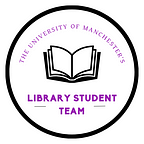‘Get Ready, Together’ — Being Critical Room
Being critical is an important part of academic study. You will have practiced criticality in your previous studies and your everyday life. One situation in which you have already applied criticality is in choosing to study at the University of Manchester!
When making this decision you may well have:
- weighed up the pros and cons of studying at Manchester;
- attended an Open Day to get more information about your course;
- Compared University of Manchester to your other options;
- Researched information on pass rates and student satisfaction.
These are all important steps in thinking critically and making an informed decision. Thinking critically about your subject and sources of information is similar to this; the more questions you ask and the more information you discover the more informed your arguments will be!
Reflect on what influenced your decision to study at Manchester. What evidence or information did you seek and use to inform your decision? Who did you speak to to help make your decision?
Being critical about information sources
Imagine we are arguing that:
“Manchester is Europe’s most important city for art, sport and culture”
Whether we agree or not, this statement is a position to be argued and not a fact! To support our argument, we need evidence. To ensure our evidence is convincing, we need to ask questions about it.
Three important things to ask are:
- Reliability: Is the evidence trustworthy?
- Objectivity: Is the evidence neutral and unbiased?
- Relevance: Is the evidence useful and related to your topic?
In the Padlet there is a range of information and evidence related to the above argument. Take some time to read at least one of these sources, and think critically about whether they are reliable, objective and relevant. To help with this, consider the following questions:
- Who wrote the source?
- When was the source created?
- Why was the source created?
- How did they come by their information?
- When was the source created?
Share your thoughts on these questions underneath the source you have read in the Padlet. You can also share any questions you have about the source in the Padlet too — asking questions is central to critical thinking! Take some time to read other people’s thoughts and questions too.
(To add your own thoughts and ideas into the Padlet press the + button underneath the relevant column).
How the Library can help develop your critical thinking skills
Our My Learning Essentials team can work with you to develop your critical thinking skills. We have a lot of resources that you can explore to discover new strategies and tips that you may find useful this year. A few of these can be found below.
- Our interactive Being Critical resource is a great introduction to what it means to be critical and has tips on critical thinking, reading and writing.
- The My Learning Essentials blog post on ‘Evaluating Information Sources’ outlines in detail the steps you can consider when analysing a source of information.
- If you prefer to listen rather than read, our ‘Evaluating your sources’ podcast may be just what you are looking for.
Contact Us
The Library and the My Learning Essentials Team are here for you, so get in touch with us using any of the following methods.
- Email us uml.teachingandlearning@manchester.ac.uk
- Use the ‘Ask a question’ tab at the right side of the page on any Subject Guide.
- Use Library Chat by going to the Library Website or MyManchester (log in required).
